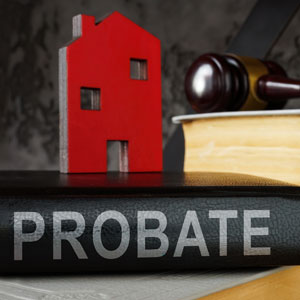 Common Misunderstandings Surrounding Probate
Common Misunderstandings Surrounding Probate
Probate is very often a complex process. This contributes to people having the many misconceptions that we have encountered over the years. We’d like to tackle them right out of the gate in this chapter. Having a clear and accurate understanding of the probate process in California is necessary if you are ever in a position where you need to face it.
The Government Is Going To Take Everything I Own
One prevalent misconception is that the government will seize any and all assets you or a loved one has in the probate process. In reality, the government does not automatically take everything. Rather, the government is typically primarily concerned with Medi-Cal recovery, creditor claims, and potential disputes among family members that could impact the estate during probate.
I’ll Avoid Probate With My Will
Another misconception is that having a will eliminates the need for probate. While a will outlines how assets should be distributed, it does not necessarily mean your estate will bypass probate, especially if the estate’s assets exceed the probate threshold. In such cases, the will simply dictates the distribution of assets within the probate process.
“DIY Probate” Is Sufficient
Some people believe they can navigate probate without legal assistance and instead use a do-it-yourself solution. With so many available on the market these days, it makes sense. It may be tempting to handle probate on your own to save costs, yet it is very often laden with pitfalls that these solutions don’t exactly account for. Even attorneys specializing in other areas of law may not have the knowledge necessary to effectively navigate probate proceedings.
Probate Can’t Be That Complicated
Navigating probate involves adhering to specific court procedures, completing forms accurately, and fulfilling notice requirements to ensure due process. A single mistake that may seem inconsequential to you, such as checking the wrong box on a form or missing a notice requirement (which can seem almost bizarre in how detailed it is), can result in significant delays and complications, unnecessarily extending the process — and the period your beneficiaries must wait before they can receive what you want to pass onto them.
Defining Probate
Now that we’ve gotten to know what probate isn’t, we’ll discuss more about what probate actually is. Just as there’s family law court, civil court, criminal court, or even bankruptcy court, there is probate court, too. It primarily deals with estate-related matters, decedent’s estate matters, and other types of cause of action, such as:
- Conservatorships;
- Elder abuse;
- Guardianships;
- Power of attorney disputes;
- Medical directive disputes;
- Trust disputes;
- And more.
That said, probate mostly deals with the decedent’s estates and transitioning assets therein to their heirs. But why is probate necessary in the first place? Let’s think it through.
Suppose you own a home and it is exclusively in your name. If you were to pass away, no one else is on title with the authority to transfer your property to anyone else. Legally, without a court order, only the title owner can take this action. Instances like these are why probate is necessary to begin with. The probate court steps in and issues an order transferring that asset to heirs or beneficiaries.
To demonstrate this a little further, realize this: executors have to actually be empowered by the court via a court order to act on behalf of a deceased person. This is really what an executor’s role is: stepping into the shoes of a deceased person and exercising authority to transfer and make decisions pertaining to the deceased’s assets within the scope of the will or the laws of intestacy on their behalf. Without the court empowering executors, if the assets are above the probate limit, they can’t do anything.
Probate’s Reach
Generally, assets in a decedent’s name that are not held in a trust and lack a designated beneficiary are subject to probate provided their combined gross value exceeds the probate limit, which is currently $184,000.
Assets held in a trust or those with designated beneficiaries, such as retirement accounts like 401(k)s or IRAs, are typically exempt from probate. For example, a home placed in a trust or a retirement account with a named beneficiary would not be considered part of the probate estate. However, if these assets are not properly structured, such as bank accounts or cars, they may become subject to probate.
Jointly owned assets, such as bank accounts or homes held in joint tenancy, usually bypass probate because they automatically transfer to the surviving owner upon the decedent’s death due to the right of survivorship. Conversely, assets held as tenants in common do not have this automatic transfer feature and may be subject to probate.
Life insurance policies with valid and ascertainable beneficiary designations are also exempt from probate. However, if a beneficiary predeceases the policyholder, resulting in an invalid designation, the policy may become subject to probate.
It’s absolutely essential to regularly review and update beneficiary designations and asset titling as part of estate planning to ensure they align with your wishes and minimize the assets subject to probate.
Probate-Related Concerns
When probate is in question, there are several concerns that people tend to have and that you too should be aware of. We have identified four particular areas that are especially taxing and overview them here. Use this information as a springboard to think through other concerns that may be relevant to your probate-related case as you prepare to go through the process.
Time
The probate process in California typically lasts about a year from the initial filing of the petition until the court orders the executor’s discharge. During this time, assets are essentially locked in the court, meaning your beneficiaries cannot receive them. This delay can cause financial and relational strain, impeding beneficiaries from accessing their inheritance as promptly as they may want.
Cost
Probate involves various fees and costs, including executor and attorney fees. These fees are set by California law and are calculated based on the gross value of the estate, not the net equity. For instance, if a home with a gross value of one million dollars has an equity of only two hundred thousand dollars, probate fees would be based on the higher gross value. In cases where the estate exceeds a million dollars, total probate expenses can easily surpass forty to fifty thousand dollars. Establishing a trust can be a cost-effective alternative to mitigate these expenses.
Privacy
Unlike probate, living trusts offer privacy since they do not need to be recorded and are not public documents. The public disclosure associated with probate includes details about the deceased’s assets, family information, and more. Furthermore, creditors can file claims publicly against the estate, exposing the decedent’s debts and other personal financial details. For those who value privacy, a living trust can be a much more discreet way of meeting your estate planning-related needs.
Medi-Cal Recovery
Another reason to avoid probate, particularly for older clients, is to circumvent potential Medi-Cal recovery claims. Medi-Cal can seek reimbursement from a decedent’s estate for medical expenses covered during their lifetime. Proper estate planning, including the use of trusts, can help protect assets from Medi-Cal recovery, ensuring beneficiaries receive their intended inheritance without interference.
Understanding the implications of probate and the benefits of alternative estate planning strategies, such as living trusts, can help you make informed decisions that go far to protect your assets, ensure timely distribution to beneficiaries, maintain privacy, and potentially avoid Medi-Cal recovery. We recommend consulting with an experienced estate planning attorney who will provide you with guidance and strategies especially relevant to your unique circumstances designed to address these concerns effectively.
For more information on Understanding The Probate Process In California, a free initial consultation is your next best step. Get the information and legal answers you are seeking by calling (949) 993-0639 today.
